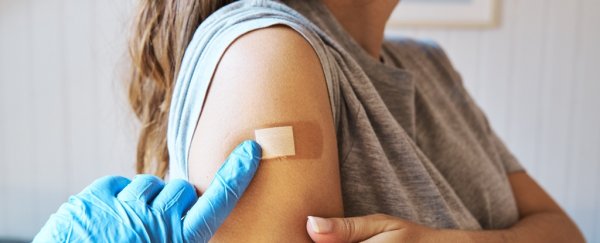The human mind, it seems, is a very powerful thing.
According to a new study involving over 45,000 patients, most of the adverse reactions people experienced after having a COVID-19 vaccination could be due to the nocebo effect.
The nocebo effect is a bit like the 'evil twin' of the placebo effect, occurring when a patient experiences negative side effects to a treatment because they're expecting to.
In a meta-analysis of 12 randomized, placebo-controlled clinical trials, a team of researchers at Beth Israel Deaconess Medical Center (BIDMC) in Boston found that up to 64 percent of adverse effects may be attributable to this kind of worry.
"Adverse events after placebo treatment are common in randomized controlled trials," says placebo researcher Julia W. Haas of BIDMC.
"Collecting systematic evidence regarding these nocebo responses in vaccine trials is important for COVID-19 vaccination worldwide, especially because concern about side effects is reported to be a reason for vaccine hesitancy."
The 12 clinical trials studied by the team included a total of 45,380 patients. Of those, 22,802 were given a real vaccine. The remaining 22,578 patients were given a placebo; that is, a harmless substance with no therapeutic value, such as saline. None of the patients knew whether they were given the vaccine or the placebo.
After the first injection, 46.3 percent of the vaccine patients reported systemic adverse events, affecting the entire body, most commonly headache and fatigue. A higher proportion of patients, 66.7 percent, reported a local adverse event, such as soreness or swelling at the injection site.
But the placebo patients also experienced adverse events, with 35.2 percent reporting systemic effects, and 16.2 percent reporting local effects.
According to the team's analysis, comparing ratios between the two groups, the nocebo effect accounted for up to 76 percent of systemic adverse events and 24 percent of local adverse events after the first vaccine dose.
This number dropped for the second dose, though. Fewer placebo patients reported adverse events; 31.8 percent for systemic effects and 11.8 for local. For the vaccine recipients, adverse events went up, with 61.4 percent of patients reporting systemic effects and 72.8 percent reporting local effects.
In all, that suggests up to 52 percent of adverse reactions after the second dose were due to the nocebo effect.
In total, this means that 64 percent of all adverse reactions could be down to the nocebo effect, which suggests that we might be able to do something about it, the researchers say.
"Nonspecific symptoms like headache and fatigue – which we have shown to be particularly nocebo sensitive – are listed among the most common adverse reactions following COVID-19 vaccination in many information leaflets," says placebo researcher Ted J. Kaptchuk of BIDMC and Harvard Medical School.
"Evidence suggests that this sort of information may cause people to misattribute common daily background sensations as arising from the vaccine or cause anxiety and worry that make people hyper alert to bodily feelings about adverse events."
In previous research, the team has been working to show that communicating openly with patients can improve outcomes, especially about placebo medication that is sometimes prescribed as treatment.
This is because the placebo effect does actually work, even if the patient knows that they're taking a placebo; but, in the latter case, fewer adverse reactions may be experienced.
In the case of COVID-19 vaccinations, informing patients about the nocebo effect could also help reduce the number of adverse responses.
"Medicine is based on trust," Kaptchuk said. "Our findings lead us to suggest that informing the public about the potential for nocebo responses could help reduce worries about COVID-19 vaccination, which might decrease vaccination hesitancy."
The team's research has been published in JAMA Network Open.
